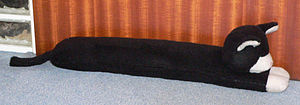A draught excluder or draft guard is a device used to prevent cold air from entering a building through gaps around entry points such as doors, windows and fireplaces.

Types
editDoor
editA door draught excluder is placed at the bottom of a door to cover the gap located at the threshold.[1][2] In the Victorian era these draught excluders would be sausage-shaped and made from fabric stuffed with sawdust.[3]
Tubular sand-filled fabric draught excluders are commonly referred to as "door snakes" in Australia.[4][5] Jenny Agutter told The Guardian that the hotel in the Outback where they stayed while making Walkabout used them to keep venomous snakes out of the guests' rooms.[6]
Window
editDraught excluders can come in the form of a self-adhesive roll of rubber or other flexible material. The material can be applied over fixed gaps in window frames.[7]
Letter box
editLetter box covers usually take the form of a brush-like cover fitted to the inside of the door. Other types include spring-loaded flaps also fitted to the inside.
Key hole
editKey holes can be draught proofed with a simple proprietary key hole cover that is fitted to the inside of the door.
Chimneys and fireplaces
editUnused or infrequently used chimney flues can be draught proofed with balloon or fabric type excluders that are fitted in the lower section of the flue. Fireplaces can also be draught proofed using a cover over the opening.
References
edit- ^ Griffiths, Sally Cameron (5 January 2010). "How to make a draught excluder". The Guardian. London. Retrieved 8 April 2012.
- ^ Clark Howard, Brian. "20 Adorable DIY Draft Snakes Fight Chills". The Daily Green (blog). Good Housekeeping. Retrieved 8 April 2012.
- ^ "The Draft Excluder". Old-House Journal. Vol. 5, no. 9. Active Interest Media. 1977. p. 104. ISSN 0094-0178.
- ^ "Make It Yourself—Door Snake". ABC Television. Retrieved 8 April 2012.
- ^ "Donate a door snake". University of Tasmania. 15 March 2012. Archived from the original on 31 October 2014. Retrieved 8 April 2012.
- ^ "How We Made Walkabout". The Guardian. London.
- ^ Nikolas Davies; Erkki Jokiniemi (2012). Architect's Illustrated Pocket Dictionary. Taylor & Francis. p. 153. ISBN 9781136444067.